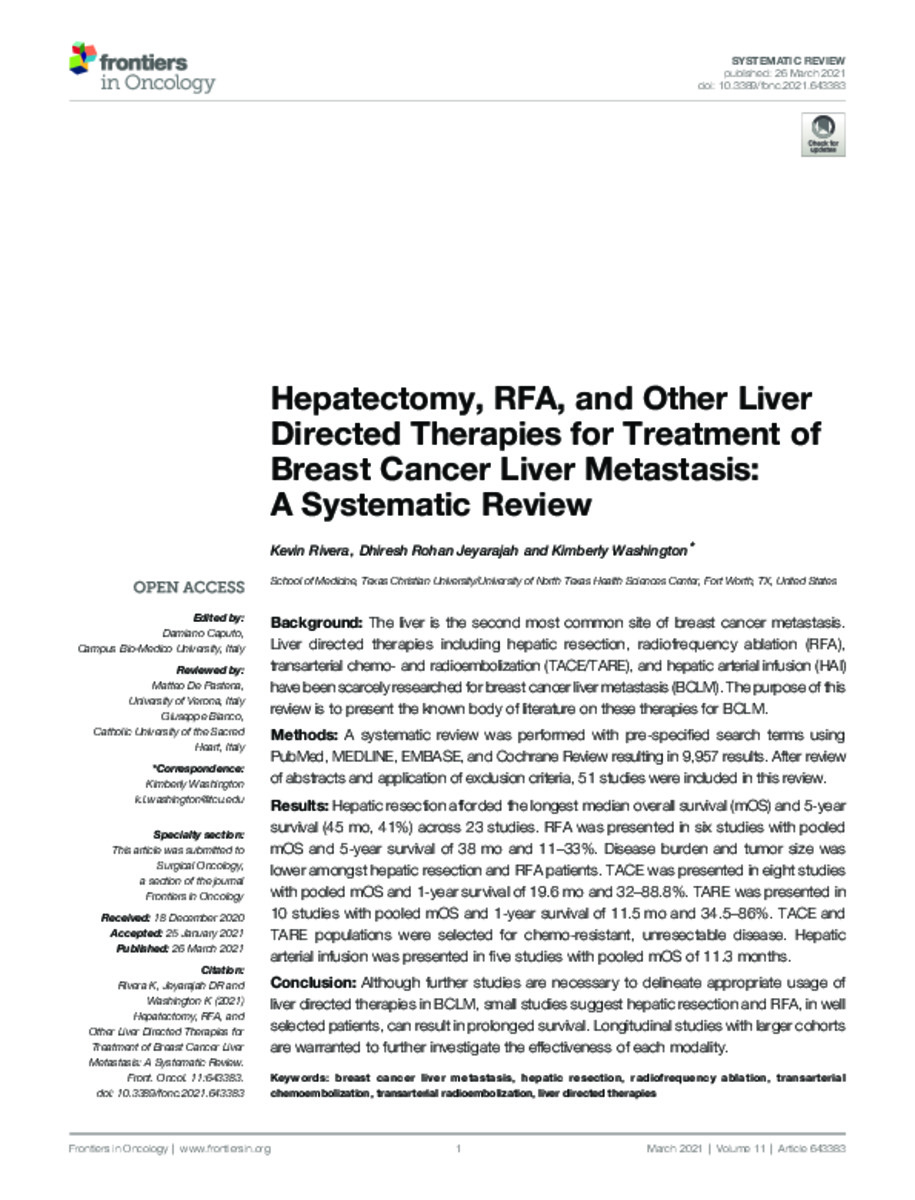Hepatectomy, RFA, and Other Liver Directed Therapies for Treatment of Breast Cancer Liver Metastasis: A Systematic ReviewShow full item record
| Title | Hepatectomy, RFA, and Other Liver Directed Therapies for Treatment of Breast Cancer Liver Metastasis: A Systematic Review |
|---|---|
| Author | Rivera, Kevin; Jeyarajah, Dhiresh Rohan; Washington, Kimberly |
| Date | 2021 |
| Abstract | Background: The liver is the second most common site of breast cancer metastasis. Liver directed therapies including hepatic resection, radiofrequency ablation (RFA), transarterial chemo- and radioembolization (TACE/TARE), and hepatic arterial infusion (HAI) have been scarcely researched for breast cancer liver metastasis (BCLM). The purpose of this review is to present the known body of literature on these therapies for BCLM. Methods: A systematic review was performed with pre-specified search terms using PubMed, MEDLINE, EMBASE, and Cochrane Review resulting in 9,957 results. After review of abstracts and application of exclusion criteria, 51 studies were included in this review. Results: Hepatic resection afforded the longest median overall survival (mOS) and 5-year survival (45 mo, 41%) across 23 studies. RFA was presented in six studies with pooled mOS and 5-year survival of 38 mo and 11-33%. Disease burden and tumor size was lower amongst hepatic resection and RFA patients. TACE was presented in eight studies with pooled mOS and 1-year survival of 19.6 mo and 32-88.8%. TARE was presented in 10 studies with pooled mOS and 1-year survival of 11.5 mo and 34.5-86%. TACE and TARE populations were selected for chemo-resistant, unresectable disease. Hepatic arterial infusion was presented in five studies with pooled mOS of 11.3 months. Conclusion: Although further studies are necessary to delineate appropriate usage of liver directed therapies in BCLM, small studies suggest hepatic resection and RFA, in well selected patients, can result in prolonged survival. Longitudinal studies with larger cohorts are warranted to further investigate the effectiveness of each modality. |
| Link | https://doi.org/10.3389/fonc.2021.643383
https://repository.tcu.edu/handle/116099117/47492 https://www.frontiersin.org/articles/10.3389/fonc.2021.643383/full |
| Department | Burnett School of Medicine |
| Subject | breast cancer liver metastasis
hepatic resection radiofrequency ablation transarterial chemoembolization transarterial radioembolization liver directed therapies |
Files in this item
This item appears in the following Collection(s)
- Research Publications [1008]
Related items
Showing a few items related by title, author, creator and subject.
-
Characterization of Echocardiogram, Peritoneal Fluid, and Transjugular Liver Biopsies in Non-Cirrhotic Patients: Assessing Liver Dysfunction in the Setting of Heart Failure vs End-Stage Renal Disease
Khwaja, Areeba (5/1/2023)Purpose: Patients with heart failure (HF) may present with cardiogenic ascites in the absence of cirrhosis. Likewise, patients with end-stage renal disease (ERSD) on hemodialysis (HD) may develop nephrogenic ascites in the ... -
Lead concentrations in the liver of the cotton rat (Sigmodon hispidus) at varying distances from the highway
Nickerson, Barbara Mulligan (1982) -
Narrative review of the role of yttrium-90 selective internal radiation therapy in the surgical management of colorectal liver metastases
Moslim, Maitham A.; Jeyarajah, D. Rohan (2021)The management of colorectal liver metastasis (CRLM) is complicated and benefits from a multidisciplinary team approach. Liver-directed therapy has been emerging as a modality for better progression-free control. In its ...
© TCU Library 2015 | Contact Special Collections |
HTML Sitemap





